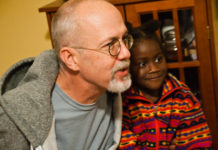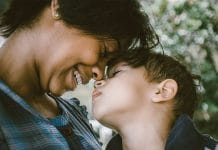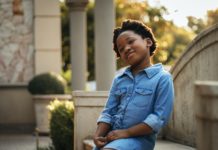In the two years that my husband David and I had been trying to adopt, I had thought a lot—a whole lot—about the day we’d first meet our child. I had envied friends’ photos of meeting their children, wondering what it would be like when (and at times if) we adopted our child. I had romantic notions that we would be crying with joy, holding our child, who would likely be confused and upset, but somewhat placated by the food and treats we would have brought him or her.
My abstract musings became more concrete in September 2008 when we received a referral of our son Jin. Our referral packet included your standard information: photos, information about his birth parents, and his vital stats (which, weighing in at 15 lbs at six months old, were great!). It also included information about his foster family, with whom he had been living since he was three months old. We saw photos of Jin surrounded by toys and in the arms of his foster mother. This was far from the images that come to mind when many think of international adoption. Jin was not in an orphanage surrounded by dozens of crying children; he was getting one-on-one attention from a family who loved him. David and I knew how important Jin’s foster family was for his development and felt fortunate that he would be living with them until we traveled to Korea to bring him home.
We prepared for Jin’s homecoming as many soon-to-be parents do—we read. We read books by adopted children, adoptive parents, psychologists; you name it, we read it. Several books touched on issues of attachment. Here, we felt good. Jin was in a loving home and would be attached to his foster family. He would “grieve” when he left his foster family, but this grieving would ultimately be good for his development. Sounds nice when you intellectualize it, doesn’t it?
When we weren’t reading, painting Jin’s room, and generally being anxious, we purchased gifts for all of those who had played a role in bringing our family together—the social worker, the head of the South Korean agency, and Jin’s foster parents. I found myself at a loss when trying to find an appropriate gift for Jin’s foster parents. What do you give the people who have been so selfless as to love this child knowing he would be leaving their home? Nothing seemed good enough. I settled on a crystal bowl for his foster mother and some sports gear for his foster father. It all seemed pretty prosaic, but I couldn’t keep buying things, deciding they weren’t good enough, and returning to the mall looking for something better.
On a Friday morning in January 2009, we received a 7 a.m. phone call: Jin’s paperwork was ready and we needed to travel within the next week. We were on a plane that Monday morning. On our first full day in Seoul, we prepared for the day I had been thinking about for years—meeting our child. It would not take place in the orphanage or government building that I had sometimes pictured, but in the home of Jin’s foster parents, accompanied by our Korean social worker. When we arrived at their home, we were greeted with unimaginable warmth. Holding back tears, Jin’s foster mother put him in my arms, tapped his hand to my chest and repeated, “Momma, Momma,” over and over again. We spent about an hour and a half with Jin and his foster parents, exchanging gifts, learning about Jin’s eating and sleeping schedule, drinking tea, and going through a beautiful photo album they made for him. Then, it was time to go. We would meet again in two days at the agency’s offices, and Jin would officially be placed in our custody. As we left the foster family’s home, a wave of sadness came over me. I had prepared for the joy that I would feel when meeting Jin, but not for the guilt and sadness I would feel when he left his foster family.
On our “free” day in Seoul, we found a place to develop a group photo the social worker had taken of all of us, purchased what I decided had to be the perfect frame and wrote Jin’s foster parents a letter thanking them for everything they had done for Jin and promising to keep in touch with them as Jin grew older.
The next day at 11 a.m., we traveled to the agency, about two miles from our hotel, to make Jin’s adoption official. While Jin was having one last check-up, we gave his foster parents the framed photo and letter. They gave Jin homemade baby food, bottles, formula and letters from each member of their family. Then, the social worker brought Jin to us. He sat in my lap without much of a fight, but you could tell he was confused and really wanted to leap into the arms of his foster mother. The social worker led us to the elevator where Jin’s foster parents were to say their goodbyes to him. As much as I wanted to be happy that we were a family, I felt so badly for Jin’s foster parents. I kept saying “thank you, thank you” in Korean, as we were lead in a daze to the elevator. I’ll never forget the sight of Jin’s foster father crying as the elevator doors closed.
I sobbed the entire cab ride back to the hotel. I knew Jin’s foster parents never had the expectation that Jin would live with them forever, but knowing this didn’t make me feel any better. As I sobbed, Jin sat in shock. He looked out the cab window quiet and confused. His shock turned to utter sadness, and sometimes all-out rage, when we arrived at the hotel. The “grieving” we had read about months before was a pretty different picture when it’s happening to your child. We tried to protect Jin as he kicked and screamed and pulled at his hair. Watching Jin grieve, with the picture of Jin’s foster parents standing at the elevator seared in my mind, I was devastated. This is not how I imagined our infamous “family day” would be. After about six hours of straight screaming, we saw Jin’s first smile. It was short-lived, but much needed for me and David. We fed Jin some of his foster mother’s homemade baby food and tried to sleep for a few hours before our 25-hour trip back home.
It has been two years since we became a family and I still think about Jin’s foster parents constantly. We exchange letters and small gifts with them. Last week they sent Jin some rockin’ toddler Asics shoes for his second birthday. We are lucky to live in a diverse community that hasn’t embraced some of the myths of adoption, but every so often, usually when we’re traveling to another part of the state or country, someone will tell Jin (who has no idea what’s being said to him) how lucky he is. I used to get very upset when people said this because it presumed the untrue story that Jin was withering away all alone until we swooped in to rescue him. It’s such a romantic, and overly-simplified, view of adoption. Now, instead of getting angry when people say Jin’s lucky, I just smile and nod, telling him later that he is lucky because he has so many people who love him—people in our community, people in other parts of the country, and some very special people halfway around the world in Seoul, South Korea.





































Kelley, I can so identify with this story. Our daughter, like Jin, was in a loving foster family for her entire first year of life. Unlike you, we were not able to meet them, and our daughter was not given the opportunity to say good-bye to them. I’m not sure it would have helped her grieving (which was formidable and still crops up, at age four, in various fears she expresses) but I think it would have been more respectful to every one involved. Thank you for recounting your story and for helping to educate others about some of the layers of complexity and misconceptions common to adoptions.